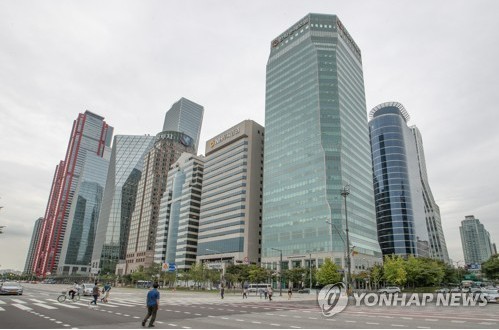(Seoul=Yonhap Infomax) Yo Been Noh—A married couple has drawn attention in South Korea’s securities industry after both appeared among the top five highest-paid employees at major brokerages, raising questions over potential conflicts of interest as their job functions overlap.
According to semiannual reports filed with the Financial Supervisory Service’s electronic disclosure system, H Securities and L Securities each disclosed the top five individual earners receiving annual compensation of over 500 million won ($385,000) in their August and November filings, respectively.
The list includes Executive Director A at H Securities and Department Head B at L Securities, who are reportedly married. The filings show that Executive Director A received a bonus of 1.604 billion won ($1.23 million) in the first half of this year, having exceeded performance targets in equity-linked securities (ELS), derivative-linked securities (DLS), and over-the-counter derivatives trading as head of the derivatives division last year.
Department Head B also received a bonus of 529 million won ($407,000) during the second and third quarters, according to the filings. While the specific bonus calculation criteria were not disclosed, B is known to be responsible for bond brokerage operations.
Industry observers have raised concerns about a potential conflict of interest, as the couple’s roles intersect in the bond market—one on the buy-side and the other as a broker. Executive Director A’s team purchases bonds such as asset-backed securities and commercial paper (CP) to manage the ELS book. If these purchases are brokered through Department Head B, brokerage commissions could effectively accrue within the family.
In South Korea’s asset-backed and CP issuance markets, a broker’s ability to secure demand sources is a key driver of performance. If Executive Director A’s ELS book becomes a demand source for Department Head B, it could not only facilitate business but also impact incentive-based compensation, according to industry sources.
Currently, there are no explicit internal regulations at securities firms prohibiting transactions between spouses or family members.
Given the over-the-counter nature of these markets, it is difficult for outsiders to verify whether private relationships, rather than broker competence, influence pricing or commission structures.
Concerns have already surfaced within the industry. One bond broker commented, “Competition in the brokerage market is so fierce that fees are often halved. While it’s long been an open secret that personal connections can influence deal flow, the fact that this has now been disclosed publicly is almost a ‘crisis’ for those involved.”
In response to the controversy, the parties involved denied any abnormal transactions or above-average deal allocations to specific brokers that could affect profit and loss. Executive Director A stated, “A conflict of interest would require transactions contrary to the company’s interests or vice versa. I have never intervened in bond trades by staff, nor exercised undue influence, even before becoming department head.” A added, “The company also monitors for any (abnormal) transactions that could result in losses.”
Under Article 44 of the Capital Markets Act, South Korean financial investment firms are required to identify, assess, and appropriately manage potential conflicts of interest between clients in accordance with internal control standards.
*

ybnoh@yna.co.kr
(End)
© Yonhap Infomax. All rights reserved. Unauthorized reproduction, redistribution, or use for AI training is strictly prohibited.
Copyright © Yonhap Infomax Unauthorized reproduction and redistribution prohibited.

